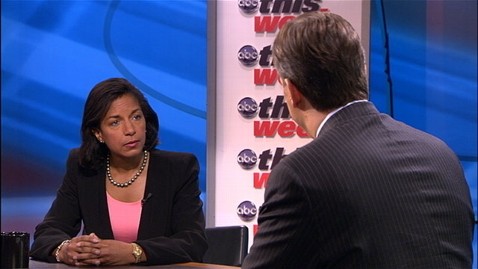Ambassador Susan Rice: U.S. Not 'Impotent' in Muslim World

ABC
U.S. Ambassador to the United Nations Susan Rice told me this morning on "This Week" that the United States is not "impotent" in the face of violent anti-American protests sweeping the Muslim world.
After showing Rice a map of protests in 33 countries around the world in recent days, I asked Rice, "President Obama pledged to repair America's relationships with the Muslim world. Why does the U.S. seem so impotent? And why is the U.S. even less popular today in some of these Muslim and Arab countries than it was four years ago?"
"We're not impotent, we're not even less popular, to challenge that assessment," Rice said in response. "What happened this week in Cairo, in Benghazi and many other parts of the region was a result, a direct result, of a heinous and offensive video that was widely disseminated, that the U.S. government had nothing to do with, which we have made clear is reprehensible and disgusting."
President Obama has been very public since the start of his presidential term that he intended to heal relations with the Muslim world that were damaged during the Bush administration.
Ambassador Christopher Stevens, along with three other Americans, were killed in Libya following an assault on the American consulate in Benghazi that came on the anniversary of the Sept. 11 attacks. The attack was followed shortly after an incident in neighboring Egypt in which protesters - angry about a film that depicts the Prophet Mohammed as a fraud - scaled the walls of the U.S embassy and tore down the American flag.
Rice disputed the idea that the U.S. has been powerless to stop the protests that spread in the last week from North Africa to throughout the Middle East, Asia, and Europe.
"It's quite the opposite of being impotent," Rice said. "We have worked with the governments in Egypt. President Obama picked up the phone and talked to President Morsi in Egypt. And as soon as he did that, the security provided to our personnel in our embassies dramatically increased."
I asked Rice if the president intended to send a message to Egyptian President Mohammed Morsi with his comments earlier this week that Egypt was not an ally or enemy of the United States. Egypt was initially slow to respond to the the attack on the American embassy in Cairo.
"The president wasn't signaling any change in the nature of our relationship," Rice said of President Obama's remarks on Egypt. "Obviously, the president had a conversation with President Morsi and a very productive one, in which he underscored that it's, of course, the responsibility of the Egyptian government as host to protect diplomatic personnel and facilities, including our own," Rice said.
"And we saw that President Morsi, immediately after that, took dramatic steps to improve the security of our facilities in Cairo and elsewhere, and then went out and repeatedly made a number of very important and powerful statements condemning the violence and conveying the message that, however hateful such a video may be, there is absolutely no justification for violence against the United States or other Western partners," Rice added.
Like "This Week" on Facebook here. You can also follow the show on Twitter here.